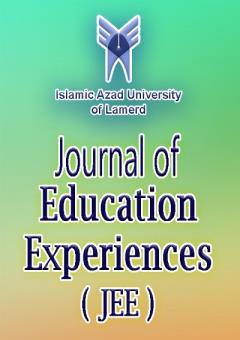Exploring the Impact of Interactionist and Interventionist Dynamic Assessment and Personality Traits on Descriptive Writing
محورهای موضوعی : 0
Zaman Kargozari
1
,
Mohammad Rostampour
2
![]() ,
leila akbarpour
3
,
leila akbarpour
3
![]()
1 - Department of English Language, Faculty of Humanities, Shiraz Branch, Islamic Azad University, Shiraz, Iran.
2 - Assistant professor of TEFL, Department of English Language Teaching, Shiraz Branch, Islamic Azad University, Shiraz, Iran.
3 - Department of English Language, Shiraz Branch, Islamic Azad University, Shiraz, Iran
کلید واژه: Dynamic Assessment, Interactionist DA, Interventionist DA, Descriptive Writing, Personality Traits.,
چکیده مقاله :
This study delves into the intricate landscape of second language (SL) writing assessment, with a focus on rater-associated variables and the impact of Dynamic Assessment (DA) on learners’ writing achievement. DA is an approach that combines instruction and assessment to mediate with the areas that students need help with to promote learners understanding and writing skills. To conduct this study, 90 participants were first given an online Oxford placement test and then, they were asked to write a descriptive essay as a pre-test, according to which, the students were randomly assigned to interventionist, interactionist, and control groups. Subsequently, the two experimental groups attended five weekly sessions in which the instructor introduced the five components of descriptive writing. The students were then given a writing task as the post-test and were asked to fill out a Five Factor Personality Inventory. The analysis of the data obtained reveals that students’ personality traits significantly affect their performance in descriptive writing. Also, both interactionist and interventionist techniques exhibit a positive influence on learners' writing achievement. Furthermore, the study compares the impact of interaction and intervention techniques, concluding that both are effective in enhancing EFL learners' writing achievement. This resonates with the broader academic discourse where dynamic assessment is recognized as a central goal of language learning, and autonomy is considered an indispensable prerequisite for successful language acquisition. The study's results are supported by parallel research reinforcing the positive influence of interactionist and interventionist approaches on learners' writing skills.
Bizhani, H. (2009). Evaluating the effectiveness of a face–to–face training program on L2 writing assessment [Master thesis, Allameh Tabatabai University]. Tehran, Iran.
Brown, H. D. (2007). Teaching by principles: An interactive approach to language pedagogy. New York: Longman.
Busato, V. V., Prins, F. J., Elshout, J. J., & Hamaker, C. (1998). The relation between learning styles, the Big Five personality traits, and achievement motivation in higher education. Personality and Individual Differences, 26(1), 129-140.
Carlson, S. B., Bridgeman, B., Camp, R., & Waanders, J. (1985). Relationship of admission test scores to writing performance of native and non-native speakers of English. ETS Research Report Series, 1985(1), i-137.
Carrell, P. (1995). The effect of writers' personalities and raters' personalities on the holistic evaluation of writing. Assessing Writing, 2(2), 153– 190.
Connor, U. & Mbaye, A. (2002). Discourse approaches to writing assessment. Annual Review of Applied Linguistics, 22, 263–278.
Costa, P. T., & McCrae, R. R. (2000). Revised NEO personality inventory. Florida: Psychological Assessment Resources.
Cumming, A. (2001). ESL/EFL instructors’ practices for writing assessment: specific purposes or general purposes? Language Testing, 18(2), 207–224.
Djiwandono, S. (2008). A handbook language test for language teachers. Jakarta: PT index.
Feist, J., & Feist, G. J. (2006). Theories of personality. New York: McGraw-Hill.
Gardner, J. (2006). Assessment and learning. UK: Sage Publications.
Gough, H. G. (1979). A creative personality scale for the adjective checklist. Journal of Personality and Social Psychology, 37(8), 1398.
Hake, B. J. (2011). Rewriting the history of adult education: The search for narrative structures. Adult Learning and Education,1, 14-19.
Hargreaves, H. (2007). The validity of collaborative assessment for learning. Assessment in Education, 14(2), 1–14.
Komarraju, M., & Karau, S. J. (2005). The relationship between the Big Five personality traits and academic motivation. Personality and individual differences, 39(3), 557-567.
Kushki, A., Nassaji, H., & Rahimi, M. (2022). Interventionist and interactionist dynamic assessment of argumentative writing in an EFL program. System, 107, 1-13.
Kushki, A., Rahimi, M., & Davin, K. J. (2022). Dynamic assessment of argumentative writing: Mediating task response. Assessing Writing, 52, 100606.
Marlin, B. M. (2003). Modeling user rating profiles for collaborative filtering. Advances in Neural Information Processing Systems, 16, 1-14.
McConnell, D. (2002). The experience of collaborative assessment in E-learning. Studies in Continuing Education, 24(1), 2002, 73–93.
McNamara, T. F. (1996). Measuring second language performance. Essex: Longman.
Moll, L. C. (2013). LS Vygotsky and education. London: Routledge.
Nassaji, H., & Swain, M. (2000). A Vygotskian perspective on corrective feedback in L2: The effect of random versus negotiated help on the learning of English articles. Language Awareness, 9(1), 34–51. https://doi.org/10.1080/09658410008667135
O’Connor, M. C., & Paunonen, S. V. (2007). Big Five personality predictors of post-secondary academic performance. Personality and Individual Differences, 43(5), 971-990.
O’Malley, J. M., & Pierce, L. V. (1996). Authentic assessment for English language learners: Practical approaches for teachers. Massachusetts: Addison Wesley Publishing Company.
Oxford test of English. (2021). Grammar level test. London: Oxford.
Oxford test of English. (2021). Vocabulary level test. London: Oxford.
Shrestha, P. & Coffin, C. (2012). Dynamic assessment, tutor mediation, and academic writing development. Assessing Writing, 17, 55–70.
Siyyari, M. (2011). On the cross relationship between self/peer assessment: Rating accuracy and personality traits, and the contribution to writing performance [Doctoral dissertation, Allameh Tabataba’i University]. Tehran, Iran.
Van Hout, T. (2016). Discourse Analysis and Journalistic Role Performance. In T. Van Hout & E. De Smedt (Eds.), Journalistic Role Performance (pp. 239-252). USA: Routledge.
Vygotsky, L. S. (1930). Mind and Society. Cambridge, MA: Harvard University Press.
Vygotsky, L. S. (1978). Mind in society: The development of higher mental processes. USA: Harvard University Press.
Wolfradt, U., & Pretz, J. E. (2001). Individual differences in creativity: Personality, story writing, and hobbies. European Journal of Personality, 15(4), 297-310.
Woodard, R., Vaughan, A., & Machado, E. (2017). Exploring culturally sustaining writing pedagogy in urban classrooms. Literacy Research: Theory, Method, and Practice, 66(1), 215-231.


